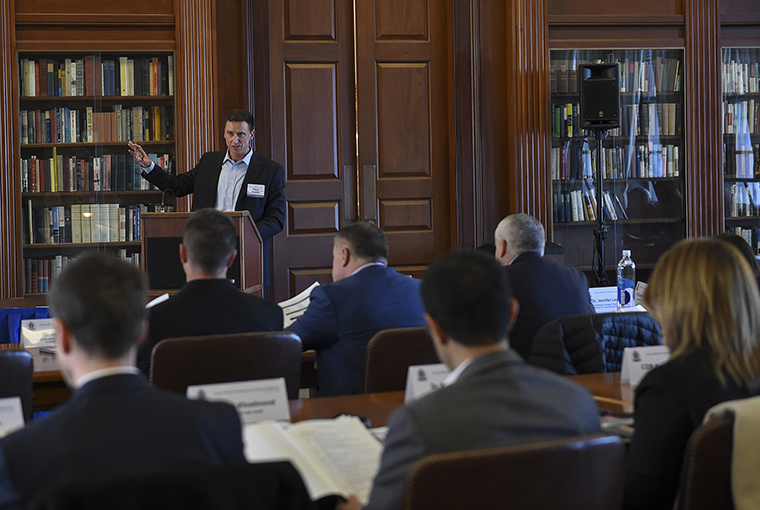Naval War College and MIT Scholars Develop Online Disease Outbreak Simulation

The simulation is focused on testing users’ responses in a civilian-military humanitarian response crisis.
Professors from the Civilian-Military Humanitarian Response Program within the College of Maritime Operational Warfare at the U.S. Naval War College (NWC) and two NWC interns from the Massachusetts Institute of Technology (MIT) PKG Center’s Social Impact Internships Program have generated the first-ever “Urban Outbreak Online Simulation” focused on responding to a notional disease outbreak in a fictional developing nation. The single-player game is available free-of-charge to the public at https://simulation-outbreak.herokuapp.com/. It launched live today, Nov. 24.
The development of the simulation was performed during the summer and fall semesters by two NWC interns, Ms. Tuyet Pham and Ms. Therese Mills, undergraduate seniors at MIT. Leveraging the geography, disease vector and insights discovered from the 2019 Urban Outbreak wargame, Mills and Pham sought to build an online simulation that would similarly require players to identify key stakeholders in response to a rapidly unfolding public health crisis and the priority activities that would need to be completed to alleviate human suffering while maintaining host nation stability.
“From a technical aspect, it was a huge learning experience,” Mills says. “Tuyet was very ambitious and insisted on starting from nothing, just have a blank file and build from the ground up. I was a bit hesitant, but I think that was the best decision we could have made. Everything in the game is exactly how we wanted it to be.”
Pham similarly noted the importance of challenging player assumptions during the three-move online game.
“During the development phase, one of the things that people said that really stuck out to me was that they thought it was a little too simple,” said Pham. “They wanted it to be more complex, more like a real-life situation. That was what we strive for with our simulation.”
The simulation builds on the work of the 2019 Urban Outbreak wargame, which was held at Johns Hopkins University’s Applied Physics Laboratory (APL) in Maryland, Sept. 18-19, 2019. That event, which was co-sponsored by NWC, Uniformed Health Services University’s National Center for Disaster Medicine and Public Health, and APL brought together more than 50 experts from the public health, emergency medicine, supply, logistics and healthcare sectors along with military members and private industries to explore the complex challenges of communication and coordination in response to a rapidly spreading disease outbreak. Many of the lessons learned from the Urban Outbreak 2019 wargame have been applied to the current COVID-19 pandemic.
Hank Brightman, EMC Informationist Chair, professor in the NWC Civilian-Military Humanitarian Response Program and the lead for this project stated that he was awestruck by the knowledge and creativity exhibited by Mills and Pham.
“Therese and Tuyet represent the unrivaled value of the NWC’s internship program,” said Brightman. “The MIT PKG Center’s Social Impact Internships Program allowed us to borrow the best and brightest minds of MIT using a 100 percent virtual, socially-distanced process from initial storyboarding through coding, testing and simulation launch.”
At a time when COVID-19 continues to test and challenge existing humanitarian response frameworks, this online simulation seeks to inform anyone interested in understanding the complexity these conditions present and aims to better prepare future leaders engaged in humanitarian response operations.
Established in 1884, U.S. Naval War College is the oldest institution of its kind in the world. More than 50,000 students have graduated since its first class of nine students in 1885 and about 300 of today’s active-duty admirals, generals and senior executive service leaders are alumni.
